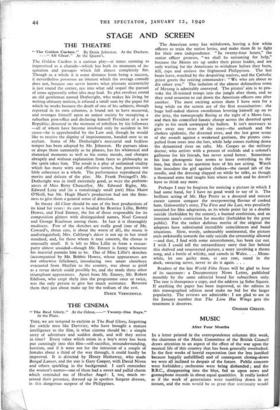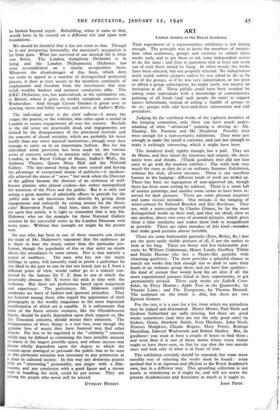MUSIC
After Four Months
IN a letter printed in the correspondence columns this week, the chairman of the Music Committee of the British Council draws attention to an aspect of the effect of the war upon the musical life of this country that has been generally overlooked. In the first weeks of horrid expectation (not the less justified because happily unfulfilled) and of consequent closing-down we were all inclined to despair of the future. Public concerts were forbidden ; orchestras were being disbanded ; and the B.B.C., disappearing into the blue, fed us upon news and gramophone records in about equal quantities. It really looked as if the work of generations were tumbling down in an instant, and the ruin would be so great that continuity would
be broken beyond repair. Rebuilding, when it came to that, would have to be started on a different site and upon new foundations.
We should be thankful that it has not come to that. Though he is not prospering financially, the musician's occupation is far from gone. What has survived of our musical life is what was fittest. The London Symphony Orchestra is in being and the London Philharmonic Orchestra has been re-established on a similar co-operative basis. Whatever the disadvantages of this basis, which does not seem to appeal to a number of distinguished orchestral players, it does at least secure to the members continuity of employment and freedom from the mischances that may befall wealthy backers and eminent conductors alike. The B.B.C. Orchestra, too, has materialised, as the spiritualists say, at Bristol, where it gives its weekly symphony concerts on Wednesdays. And though Covent Garden is given over to dancing, opera and ballet survive, and thrive, at Sadler's Wells.
The individual artist is the chief sufferer—I mean, the singer, the pianist, or the violinist, who relies upon a recital in London to secure engagements all over the country. Recitals in the old sense are practically dead, and engagements are limited by the disappearance of the provincial festivals and the concerts of choral societies, which are probably hit more hardly than any other musical institutions—though even they manage to carry on in an impromptu fashion. But for the individual some provision has been made by the various series of concerts started, to mention only some of those in London, at the Royal College of Music, Sadler's Wells, the Embassy Theatre, Queen Mary Hall and the National Gallery. The last-named being the most central and having the advantage of exceptional means of publicity—it incident- ally achieved the status of " news " last week when the Director of the gallery became the director of an orchestra of well- known pianists who played cuckoo—has rather monopolised the attention of the Press and the public. But it is only one among a great number of admirable efforts to provide for the public and to aid musicians both directly by giving them engagements and indirectly by raising money for the Musi- cians' Benevolent Fund. And here, since his letter started me upon this article, it is right to remember that it was Mr. Makower who set the example for these National Gallery concerts by his successful series in the London Museum over many years. Without that example we might be the poorer now.
No one who has been to any of these concerts can doubt the truth of Mr. Makower's statement that the audiences go to them to hear the music rather than the particular per- former, though the popularity of this or that artist no doubt affects the attendance to some extent. Nor is that entirely a matter of snobbery. The man who has not too many shillings to spare, will naturally tend to prefer a performer he has liked in the past to one he has not heard, just as I, from a different point of view, would rather go to a concert con- ducted by the famous Sir Y. Z. than to one at which the deservedly obscure Mr. X waves his stick in time with the orchestra. But these are preferences based upon judgement and experience. The preferences Mr. Makower rightly condemns are born of fashion and ignorant prejudice. They are fostered among those who regard the appearance of their photographs in the weekly magazines as the most important manifestation of which art is capable. It is unfortunate that some of the finest artistic ventures, like the Glyndebourne Opera, should be partly dependent upon their support or, like the Toscanini concerts, should attract their attention. The disappearance of these things is a real loss, even though the genuine love of music they have fostered may find other objects. Far less to be regretted is the " celebrity " concert, which may be defined as containing the least possible amount of music in the largest possible space, and whose success was almost wholly dependent upon the degree to which the concert-agent managed to persuade the public that to be seen at this particular occasion was necessary to any pretension to a place in cultured society. In this way any dexterous pianist with an " interesting " personality, any singer with a film- success, and any conductor with a good figure and a showy style in handling his stick, could be put across. They are among the people who never will be missed.
DYNELEY HUSSEY.



































 Previous page
Previous page